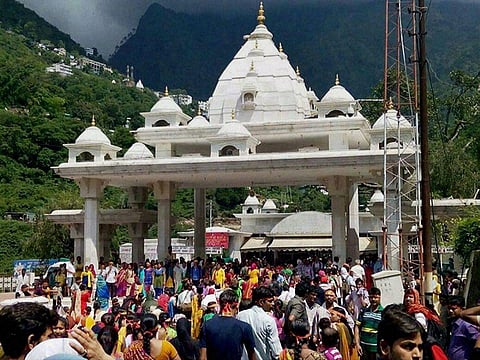

SRINAGAR: In a major relief for pilgrims visiting the Vaishno Devi shrine, the week-long shutdown in Katra, the base camp for the pilgrimage, has been called off by the Vaishno Devi Sangarsh Samiti (VDSS) after the government halted work on the ropeway project and released all 18 detained Sangarsh Samiti members on Tuesday evening.
On Tuesday evening, authorities and the VDSS, which spearheaded the agitation against the proposed ropeway project by the Vaishno Devi Shrine Board, reached an agreement.
Divisional Commissioner Jammu, Ramesh Kumar, stated that work on the ropeway project would remain halted until the Sangarsh Samiti members hold discussions with a committee constituted by Lt. Governor Manoj Sinha, who is the chairman of the Vaishno Devi Shrine Board. “The committee will make a decision after considering religious sentiments and Katra’s economy. LG Sinha has also asserted that religious sentiments will be respected and Katra’s economy will be safeguarded,” he said.
The Divisional Commissioner also confirmed that all 18 Sangarsh Samiti members detained by the police had been released. These members were detained on the first day of the week-long shutdown in Katra on December 25.
Sangarsh Samiti Chairman Bali Ram Rana noted that talks between the administration and the Sangarsh Samiti had been ongoing for several days. He further announced that markets would reopen on Tuesday night.
“All shops and business establishments will resume normal operations from Wednesday,” Rana said.
The eight youth who had gone on a hunger strike also ended their protest following the release of the Sangarsh Samiti leaders and the administration’s decision to halt work on the ropeway project.
By Wednesday, Katra town was fully operational, with shops and other businesses open, and vehicular traffic back on the roads.
The Vaishno Devi Sangarsh Samiti has been leading the agitation against the ropeway project. The proposed ₹250-crore project aims to connect Tarakote Marg to Sanji Chhat, facilitating access to the temple for elderly persons and others who struggle to climb the 13-km-long track to the cave shrine.
However, locals, including traders, shopkeepers, pony operators, palanquin bearers, laborers, and hoteliers, oppose the project, arguing that it threatens their livelihoods. According to the Sangarsh Samiti leaders, the ropeway not only jeopardizes Katra’s economy but also offends the religious sentiments of the people.
“We will not allow the construction of the ropeway project in any way,” said a released Sangarsh Samiti member.
The calling off of the week-long shutdown by the Sangarsh Samiti has brought significant relief to pilgrims visiting the shrine. During the shutdown, pilgrims faced hardships as food and drinking water were unavailable due to the closure of markets. Elderly pilgrims, in particular, struggled without access to laborers, palanquins, and pony operators.